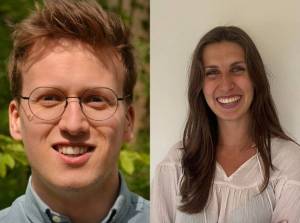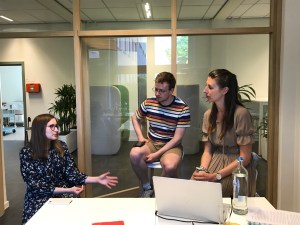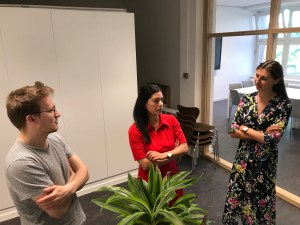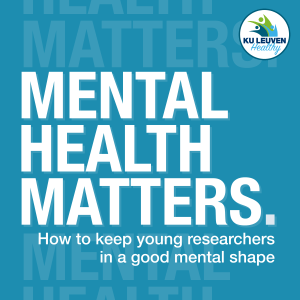BY ROBYN VANHERLE AND PIETER-JAN MARENT. Mental Health Matters. In addition to physical health, the mental health and well-being of young researchers are also important— paramount, even. KU Leuven Healthy has therefore decided to launch a new podcast series: Mental Health Matters. And we, Robyn and Pieter-Jan, were given the honour of hosting it. In this blog, we share our experiences about making the podcast, as well as some things we learned from it.
In our podcast series, we host various PhD students and postdocs from KU Leuven for candid interviews regarding the mental challenges young researchers experience during their research process. The podcast was launched at the end of May and has since received extensive support from various quarters, ranging from enthusiastic emails to retweets on Twitter to testimonials from people who identified with the stories. The support is heartwarming and, in our opinion, also shows the need to make the topic open for discussion.
How it started
How did we get involved with KU Leuven Healthy, this topic, and more specifically, this podcast? Both of us came into contact with the new KU Leuven Healthy project through an internal email last year, and we signed up as ambassadors. The choice to become an ambassador was primarily research-related.
Robyn’s doctoral project investigates the relationship between young people’s social media use and alcohol consumption, and Pieter-Jan’s doctoral project investigates the relationship between exercise, sitting and sleeping with optimal cognitive ageing. Both projects focus on factors that could potentially affect individuals’ health.
In addition to research interests, personal interests also played a major role. Both of us maintain our physical health through regular exercise and notice how much exercise benefits our mental health. As such, we are happy to work with KU Leuven Healthy to get our fellow students into action—literally and figuratively.
The challenges
We are currently both in the third year of our PhDs. It has been an instructive, exciting and extraordinary journey so far, but there is no denying that it has been accompanied by several challenges. In our first year, we both quickly encountered feelings of uncertainty and wondered if we were even in the right place. In stronger terms: we felt like imposters who had gone unnoticed so far, but for how long? Only at a KU Leuven information event did we learn of a phenomenon called “imposter syndrome”. There is an entire research field around it, so we were certainly not the only ones with these feelings. So why had we never heard of it? Did our fellow students feel the same way?
It was an important prompt to question ourselves and our work environment. After all, how can we support each other if we never talk about the difficulties we all experience from time to time? There is a need for an open atmosphere to not only talk about the good and exciting parts of PhD life but also about the associated mental challenges.
There is a need for an open environment where young researchers can discuss doubts and uncertainties among themselves and with their supervisors.
Talking openly about vulnerabilities makes us stronger, both as researchers and as human beings.
What we have learned
We would also like to look back at the course of our podcast adventure—a project that was a bit out of our comfort zone.
First, it was striking how relatable the stories were, even across research disciplines. This shows how challenging academia is and how important it is to recognise and talk about it. As discussed in the podcasts, we too often compare ourselves to others when they excel (e.g., in publishing articles, presenting at conferences and securing funding). After all, these are the moments that are often shown, both offline and online. Yet it is important to create a movement where lesser moments can also be shared. This is important for yourself and others. For example, by openly discussing difficulties or doubts, you may receive support from a listening ear. At the same time, it may also make others feel comfortable enough to show their vulnerabilities. We all have a bad day from time to time, and knowing we are not alone can make the burden that much lighter.
We also learned a lot through discussions with fellow researchers and insights from experts. At the end of the day, we, too, are still searching for how best to arm ourselves against the challenges of a PhD programme and life itself. Unfortunately, this does not happen overnight. As discussed in the podcast, a PhD or postdoc programme is a learning process. It works by trial and error. Similarly, our work-life balance may not always be right, or we may let stress get the better of us. It is important to dwell on this and be aware of it.
Finally, we also put a few concrete, practical tips from the podcast into practice in our own lives. For example, since the podcast with Alice, Pieter-Jan has used an email signature stating that everyone may have different work hours and he does not expect his emails to be answered outside the recipient’s work hours. Robyn, in turn, specifically uses breathing exercises when stress threatens to become overwhelming. We also learned from Sinéad’s story and Margarita’s vision of life from our interviews for the podcast: doing a PhD is a learning process where you have to be open to unexpected twists and turns and have faith that everything will work out. Instead of thinking about the limitations, it can be relieving to consider the opportunities that a PhD offers in academia and beyond.
Our dreams
What else do we hope to accomplish with this podcast series? First and foremost, we hope that by providing relatable stories, this podcast can be a source of support for all young researchers.
We also hope that by discussing advice and insights, the podcast can be a source of inspiration. We understand that there is no “one size fits all” and that certain stories will be relatable to some PhD students but not others. Likewise, the advice and tips will not work for everyone, but it is important to find your own way in this and see what works for you. As such, we do not attempt to provide a straightforward answer to what methods can promote the mental health of young researchers, but we hope this podcast can be an impetus toward openly discussing the topics provided. This may be different everywhere, but the key is that research groups should work together to find an appropriate way to discuss these topics. It may sound cliché, but we can achieve more together.









